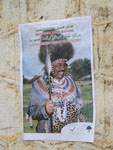
This post originally appeared on Foreign Policy.
Pretend for a moment that you are from a place that has been terrorized off and on by its own government (a military regime that took power by coup) for more than two decades. In the 1980s, you were forced to flee your home when this government bombed your village and provided arms to some of your neighboring rival tribes. Now that the war has ended and you have moved back home, you have the chance to vote in the first multiparty elections your country has held in 24 years. In less than two weeks, you will cast your vote, issuing your verdict on the government that inflicted suffering and mass violence upon your people. The choice seems clear: You would vote it out. But maybe not — because this is Sudan. And here, the only conventional wisdom that seems to endure through successive coups, wars, and shifting political alliances is that the leaders who manage to hold on to power should never be underestimated.
Case in point is Sudan’s President Omar Hassan al-Bashir, who in recent weeks has been on a whirlwind campaign tour of South Sudan — the very region that his government was at war with for some 20 years. He is stumping to win votes for the elections that will take place April 11 to 13. And instead of appealing to Southern voters with lofty promises of hospitals and schools, Bashir brings two central messages to the people of the South: a promise and a veiled threat.
Vote for me, he says, because I am the one who can uphold the Comprehensive Peace Agreement (CPA) that brought an end to the conflict in 2005. There are two partners to the peace agreement, and I represent one of them. Then Bashir goes further: Without my support, it will be difficult to hold the referendum for South Sudan’s independence, slated for January 2011. In a region so devastated by war and eager not to return to it, that campaign message might well be enough to lure voters, especially because the main Southern candidate, Yasir Arman, pulled out on March 31, citing electoral irregularities. And the rest of the opposition parties announced on April 1 that they will likely boycott the elections.
The unfolding election campaign follows a pattern that has characterized much of Sudan’s independent history — namely, the forcible intimidation and marginalization of the South and other peripheral populations. In the most recent civil war between the South and Khartoum, rebels fought for the right of their people to participate equally, along with other marginalized groups in places like Darfur, in governing their country. They were supposed to have won it with the 2005 peace agreement, signed between Bashir’s ruling National Congress Party (NCP) in Khartoum and the Southern rebels, the Sudan People’s Liberation Movement/Army (SPLM). That document was premised on the "democratic transformation" of Sudan, and nationwide elections were envisioned as a cornerstone of this process.
Five years later, that ideal has been shelved in favor of more pragmatic policies. Compromises on hotly contested CPA-related issues such as the national census have been reached through backroom deals by the ruling elites in the NCP and the SPLM, the so-called "peace partners." Yet even in spite of these recent deals, tensions between the North and South are reaching an all-time high. The idea that Bashir and his party could appeal to the same population whom they mercilessly bombed and drove from their homes for the better part of the past two decades arguably defies logic. And yet, for some Southerners, the decision to vote for Bashir was an easy one.
For starters, Bashir is simply better known than any of the other 12 presidential candidates. "People must vote for someone they know," said Patrick, a motorcycle taxi ("boda") driver in the Southern capital of Juba. As a child, Patrick fled the war with his family, ending up in a refugee camp in northern Uganda. He returned to Sudan along with more than 2 million of his fellow Southerners after the fragile peace was brokered. Still, he explained, "[We] can’t vote in the darkness."
Click here to continue reading.
Photo: Bashir election poster in southern Sudan (Enough/Maggie Fick)

